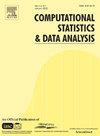Sample-specific cooperative learning integrating heterogeneous radiomics and pathomics data
IF 1.6
3区 数学
Q3 COMPUTER SCIENCE, INTERDISCIPLINARY APPLICATIONS
引用次数: 0
Abstract
Multi-omics analysis offers unparalleled insights into the interlinked molecular interactions that govern the underlying biological processes. In the era of big data, driven by the emergence of high-throughput technologies, it is possible to gain a more comprehensive and detailed understanding of complex systems. Nevertheless, the challenges lie in developing methods to effectively integrate and analyze this wealth of data. This challenge is even more apparent when the type of -omics data (e.g., pathomics) lacks pixel-to-pixel or region-to-region correspondence across the population. A novel sample-specific cooperative learning framework is introduced, designed to adaptively manage diverse multi-omics data types, even when there is no direct correspondence between regions. The proposed framework is defined for both continuous and categorical outcomes, with theoretical guarantees based on finite samples. Model performance is demonstrated and compared with existing methods using real-world datasets involving proteomics and metabolomics, and radiomics and pathomics.
样本特异性合作学习整合异质放射组学和病理数据
多组学分析为控制潜在生物过程的相互联系的分子相互作用提供了无与伦比的见解。在大数据时代,在高通量技术的推动下,对复杂系统有了更全面、更详细的了解。然而,挑战在于开发有效整合和分析这些丰富数据的方法。当组学数据类型(如病状)在人群中缺乏像素到像素或区域到区域的对应关系时,这一挑战更加明显。引入了一种新的样本特定合作学习框架,旨在自适应地管理不同的多组学数据类型,即使在区域之间没有直接对应的情况下。所提出的框架是为连续和分类结果定义的,具有基于有限样本的理论保证。使用真实世界的数据集,包括蛋白质组学和代谢组学、放射组学和病理学,展示了模型的性能,并与现有方法进行了比较。
本文章由计算机程序翻译,如有差异,请以英文原文为准。
求助全文
约1分钟内获得全文
求助全文
来源期刊

Computational Statistics & Data Analysis
数学-计算机:跨学科应用
CiteScore
3.70
自引率
5.60%
发文量
167
审稿时长
60 days
期刊介绍:
Computational Statistics and Data Analysis (CSDA), an Official Publication of the network Computational and Methodological Statistics (CMStatistics) and of the International Association for Statistical Computing (IASC), is an international journal dedicated to the dissemination of methodological research and applications in the areas of computational statistics and data analysis. The journal consists of four refereed sections which are divided into the following subject areas:
I) Computational Statistics - Manuscripts dealing with: 1) the explicit impact of computers on statistical methodology (e.g., Bayesian computing, bioinformatics,computer graphics, computer intensive inferential methods, data exploration, data mining, expert systems, heuristics, knowledge based systems, machine learning, neural networks, numerical and optimization methods, parallel computing, statistical databases, statistical systems), and 2) the development, evaluation and validation of statistical software and algorithms. Software and algorithms can be submitted with manuscripts and will be stored together with the online article.
II) Statistical Methodology for Data Analysis - Manuscripts dealing with novel and original data analytical strategies and methodologies applied in biostatistics (design and analytic methods for clinical trials, epidemiological studies, statistical genetics, or genetic/environmental interactions), chemometrics, classification, data exploration, density estimation, design of experiments, environmetrics, education, image analysis, marketing, model free data exploration, pattern recognition, psychometrics, statistical physics, image processing, robust procedures.
[...]
III) Special Applications - [...]
IV) Annals of Statistical Data Science [...]
 求助内容:
求助内容: 应助结果提醒方式:
应助结果提醒方式:


